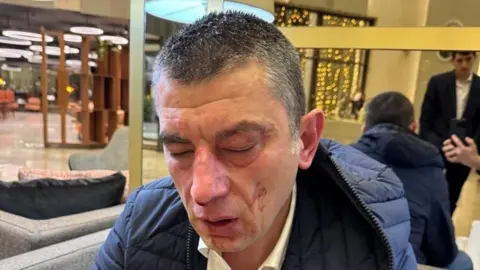 Reuters
ReutersGeorgia’s former prime minister and opposition party leader Giorgia Gakharia was treated in hospital after being attacked in a hotel, allegedly by members of the ruling Georgian Dream party.
Gakharia reportedly suffered a broken nose in the incident in Batumi on the Black Sea coast. His party said it was “politically motivated” and aimed at intimidating the opposition.
The South Caucasus country has seen political turmoil and repeated attacks on opposition figures and protesters in the months following Georgia’s disputed elections in late October.
The protests have been held every night since the leaders of the Georgian Dream announced a month later that they were freezing the issue of opening negotiations on joining the European Union.
Hundreds of entrepreneurs took part in a three-hour strike on Wednesday, the 49th day of protests in a row.
Video of the incident late Tuesday night in the lobby of the Sheraton Hotel in Batumi was unclear, although Gakharia could be seen being pushed to the floor by a group of men. Pictures later showed him with blood on his shirt.
Giorgia Gakharia posted on social media Wednesday morning that he was “healthy,” but the doctor treating him said he had broken a bone in his nose and had a concussion.
European Commission spokeswoman Anitta Hipper said the “reported involvement of Georgian Dream politicians in the brutal attack” was shocking, and there was no place for violence or impunity in any democracy.
However, Georgian Dream figures accused Gakharia of initiating the conflict himself. Lawmaker Levan Machavariani told reporters that everything is clear from the recording, while Tbilisi Mayor Kakha Kaladze said that the opposition’s program is based on lies and deception.
The Georgian Dream MP and other party members were linked to the attack, which came shortly after Zviad Koridze, a journalist and regional head of the anti-corruption organization Transparency International, was also attacked.
Koridze visited Batumi to follow the trial of a leading media personality, Mzia Amaghlobeli, founder of the independent online publications Netgazeta and Batumeleba.
She was remanded in custody in the Black Sea city on Tuesday, two days after her arrest during a heated altercation with a police officer in which she was accused of slapping a police officer. The cameraman was also arrested.
The UK’s ambassador to Georgia, Gareth Ward, said the development of the political crisis in recent days was “extremely worrying”. “Repeated violence against opposition politicians and arbitrary detention of journalists and protesters is unacceptable,” he said.
Gakharia is not the first opposition leader to face violence in recent weeks. Nika Gvaramia, who heads the Coalition for Change, was knocked to the ground unconscious when he was detained in the capital Tbilisi last month.
Dozens of Georgian journalists and protesters were also attacked and injured by pro-government thugs during the overnight protests.
The Georgian dream is accused by the EU and the US of democratic backsliding, and opposition groups accuse the party and its billionaire Bidzina Ivanishvili of following Russia’s interests, while the vast majority of Georgians want to join the EU.
Giorgi Gakharia was previously a leading member of Georgian Dream until 2021, serving as interior minister and then prime minister, before founding his own opposition party For Georgia.
In a statement, Georgian Ombudsman Levan Ioseliani condemned the attacks on both Gakharia and Zviad Koridze. He called for an immediate reaction “so as not to encourage attacks on politicians and journalists”.
Gakharia’s party was one of four opposition groups that secured seats in the October election, but all refused to take their seats, accusing the ruling party of vote rigging.
The European Parliament called for a repeat of the elections, describing them as neither free nor fair, and the EU’s high representative for foreign policy, Kaja Kallas, accused the government of using repression against the opposition.

